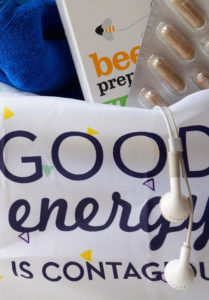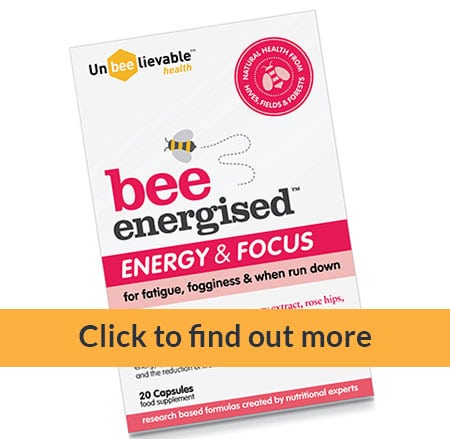
Bee Pollen
Bees collect pollen from plants which is they mix with nectar and then store in the hive where it undergoes fermentation which is how it gets all of its incredible nutrients. In fact, did you know that bee pollen is one of the only substances which contains the full range of vitamins, minerals and amino acids? Bee Pollen is shown in studies to improve muscle protein and energy metabolism and to be helpful for our energy levels.
Rosehips
You may see these fruits of the rose plant on the hedgerows in England in the late Summer/early Autumn. They are beneficial for a huge variety of health conditions mainly due to how many nutrients they contain. Including vitamins C, A, E & B vitamins, as well as calcium, iron, selenium, manganese, magnesium, zinc along with compounds such as lycopene, beta-carotene and pectin. In addition, they include antioxidants such as flavonoids, phytochemicals and carotenoids – just to name a few. They can benefit our energy levels by helping us have a good intake of all these nutrients.
Spirulina
Spirulina is a microscopic blue-green algae. It has a high protein and nutrient content which makes it an excellent dietary supplement for people on a vegetarian or vegan diet. It is also a high source of iron which makes it particularly good for energy levels. One of the first signs of a deficiency in iron is lethargy and extreme tiredness.
Green Tea leaf
Green tea and black tea come from the same plant. The difference is that green tea is not oxidised in any way during production. The leaves are simply harvested from the tea plant and heated to prevent withering and oxidation. Because of this lack of processing, Green Tea is thought to be higher in antioxidants. Green tea contains naturally occurring caffeine and plant compounds called catechins including a compound known as EGCG which helps with energy levels due to the natural amount of caffeine it contains. This is a healthy way to obtain energy from caffeine rather than from drinks which have artificial caffeine added.
Matcha Green Tea
Matcha and green tea are derived from the same plant. The difference is due to the fact that match tea is shaded from the sun for the final 20 – 30 days prior to harvesting. This protection from direct sunlight increases the amount of chlorophyll by restricting photosynthesis in the leaves. This process increases the amount of theanine and alters the effects of caffeine. The increased amount of theanine has the great benefit of relaxing the body while still giving us a good supply of energy and an alert mind.
Siberian Ginseng
Siberian Ginseng is the root of the Eleutheroccocus centicocus plant. It has been used in China and Russia for centuries for a variety of health issues. One benefit is that it has been shown in studies to help reduce fatigue and promote energy. The studies have linked some of the components in Ginseng such as polysaccharides and oligopeptides, with a higher energy production in cells. This energy production seems to benefit circulation and brain function as well.
Rosemary Extract
It is only relatively recently that the health benefits of rosemary extract have been explored. It contains over 24 different antioxidants and a small study showed it significantly improved memory speed. And another larger one showed it demonstrated improved cognitive functioning We also now know that extracts from rosemary may activate energy sensing molecules in cells. This then activates pathways to help break down lipids and carbohydrates in order to release their energy.
Vitamin B12
Vitamin B12 (along with the other B Vitamins) is responsible for turning the food you eat into energy that your cells can use. A lack of Vitamin B12 can result in feeling tired and lethargic and even lead to anaemia. It is worth noting that most of the Vitamin B12 we get from our diet is from animal based products so if you are a vegetarian or vegan you may need to keep an eye on your Vitamin B12 levels.
Vitamin B6
Vitamin B6 is also known as pyridoxine. It is one of the eight vitamins in the B complex group. Did you know that it is involved in more than 150 enzyme reactions in our body? If you are low in Vitamin B6, you may feel unusually tired and lethargic. The main reason for this is that Vitamin B6 helps make haemoglobin- the protein in your red blood cells which helps carry oxygen through your body. If your cells aren’t getting enough haemoglobin, it can make you feel tired and weak.
Key Benefits
- Helps improve mental clarity and alertness
- Supports energy production and maintenance
- Antioxidant rich and nutrient dense formula provides ongoing benefits
- Supports the body during times of stress
- Benefits build with time
When to use Bee Energised
- When experiencing fatigue and tiredness
- During stressful, energy draining periods
- When lacking focus and attention
- If exercising frequently
- During and after travel
- When studying
- To help improve brain fog





